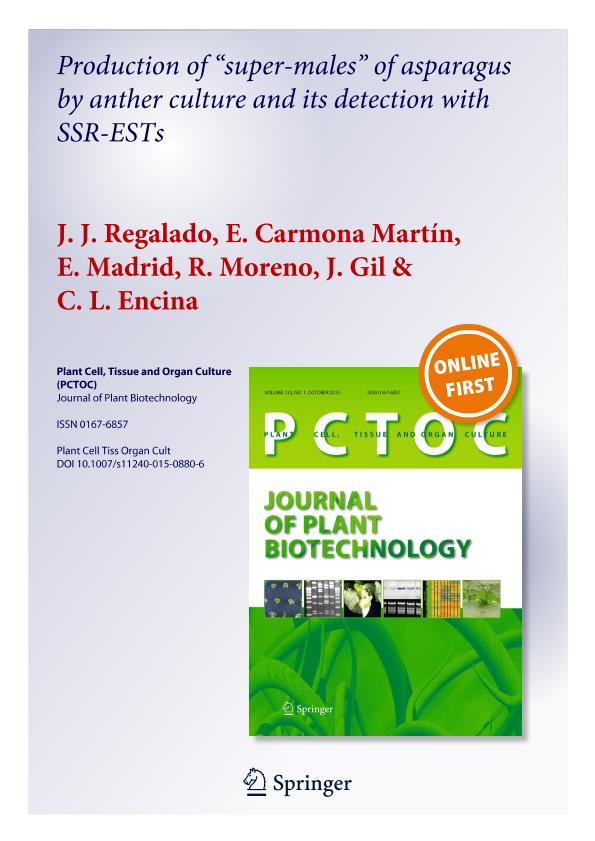Artículo
Production of “super-males” of asparagus by anther culture and its detection with SSR-ESTs
Fecha de publicación:
01/2016
Editorial:
Springer
Revista:
Plant Cell, Tissue and Organ Culture
ISSN:
0167-6857
e-ISSN:
1573-5044
Idioma:
Inglés
Tipo de recurso:
Artículo publicado
Clasificación temática:
Resumen
Anther culture is used to develop asparagus “super-male” (di-haploids) in asparagus, which can be used to develop “all-male” varieties, by crossing them with suitable females; their progenies will be formed only by males which is advantageous for producers. This report describe a new anther culture protocol adapted to “Morado de Huétor”, a Spanish tetraploid landrace, and studied the different factors involved in callus proliferation success from anther explants such as the microspore development stage, or the type of stress used to induce the symmetric division of the microspores, to obtain a high success rate (90 %). For plantlets regenerates from anther culture (PRACs) regeneration we develop a proliferation media supplemented with a combination of pCPA and BA able to induce callus proliferation and plantlet regeneration in the same step in a 50 % of calli, simplifying the procedure. The high percentage of heterozygous male recovery, originated from somatic cells, is an important problem in the anther culture, and to elucidate the origin of PRACs we have combined different tools: ploidy analysis, characterization with the linked sex-marker Asp1-T7 and with EST-SRRs. We can establish that 50 % of PRACs obtained in this work were regenerated from diploid microspores of “Morado de Huétor”, regenerating diploid, di-diploid and tetra-diploid plantlets. The di-diploids males (MMmm) would generate a ratio male:female of 5:1 (83.3 %) and the tetra-diploid males (MMMMmmmm) a ratio male:female of 69:1 (98.6 %), so the tetra-diploid males could be considered “super-males” and be used to develop “all-male” varieties of “Morado de Huétor”.
Archivos asociados
Licencia
Identificadores
Colecciones
Articulos(OCA CIUDAD UNIVERSITARIA)
Articulos de OFICINA DE COORDINACION ADMINISTRATIVA CIUDAD UNIVERSITARIA
Articulos de OFICINA DE COORDINACION ADMINISTRATIVA CIUDAD UNIVERSITARIA
Citación
Regalado González, Jose Javier; Carmona Martín, E. ; Madrid, E.; Moreno, R.; Gil, J.; et al.; Production of “super-males” of asparagus by anther culture and its detection with SSR-ESTs; Springer; Plant Cell, Tissue and Organ Culture; 124; 1; 1-2016; 119-135
Compartir
Altmétricas




